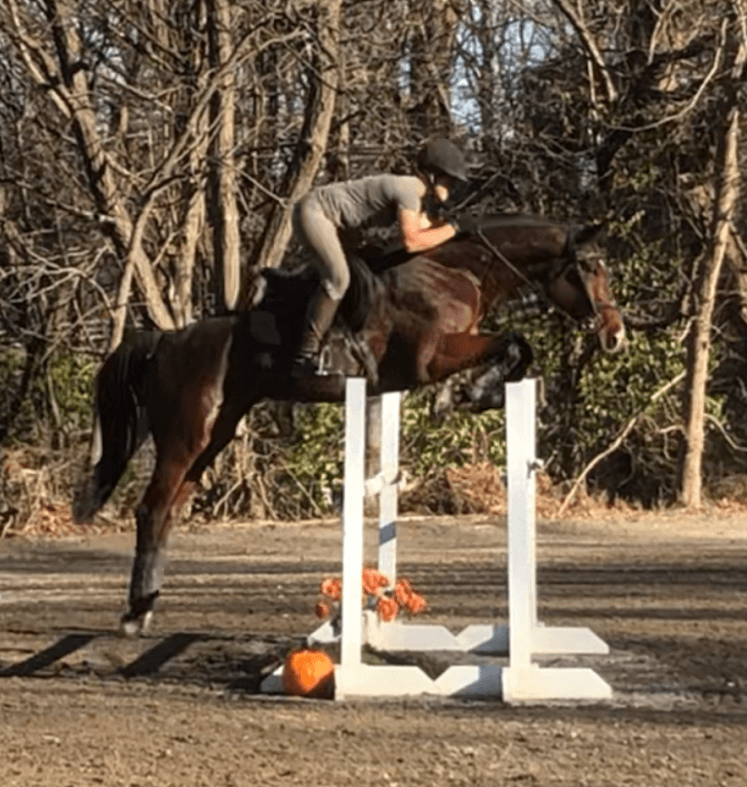You know the feeling, when you have been incredibly hungry and finally take a bite of food? Satiating your hunger feels instantaneous. You feel better immediately. But when you think about it, your feeling better immediately is sort of strange. It takes minutes for us to start digesting the food, and hours for it to enter our bloodstreams as useful calories and energy for our cells. So why do we feel better so quickly?
 Luke, a young horse I have in training, throwing a nice shape over a fence.
Luke, a young horse I have in training, throwing a nice shape over a fence.
In short, it’s because our minds are playing tricks on us. Our mind knows the sequence of events: after that bite of food, our body will start to feel better in a few minutes. So basically our mind takes a shortcut and tells us to start feeling better before we actually do. This NYT article called “Your Brain Is Not For Thinking” (great read; highly recommend!) sums it up well, using a term called “body-budgeting”:
Your brain runs your body using something like a budget. A financial budget tracks money as it’s earned and spent. The budget for your body tracks resources like water, salt and glucose as you gain and lose them. Each action that spends resources, such as standing up, running, and learning, is like a withdrawal from your account. Actions that replenish your resources, such as eating and sleeping, are like deposits.
Your brain keeps track of your budget, they explain:
The scientific name for body budgeting is allostasis. It means automatically predicting and preparing to meet the body’s needs before they arise. Consider what happens when you’re thirsty and drink a glass of water. The water takes about 20 minutes to reach your bloodstream, but you feel less thirsty within mere seconds. What relieves your thirst so quickly? Your brain does. It has learned from past experience that water is a deposit to your body budget that will hydrate you, so your brain quenches your thirst long before the water has any direct effect on your blood.
Here is the key phrase in that description for me: [your brain] has learned from past experience. It is fairly obvious, when you think about it: we have a brain, so we remember things. We have a trove of past experiences on which we draw when encountering new experiences.
We’d do well to think about allostasis when training our horses, not in the sense of being hungry or thirsty, but in the sense of understanding that the brain processes information about how the body is feeling even before the body reacts. If we can keep this in mind, lots of our problems in training and competition begin to make sense. Let’s take an example. A horse has felt stressed by a new movement he is learning on the flat. He can do it pretty well, but the next several times the rider prepares for the movement, the horse’s brain shuts down and his body tenses, even before the rider gets a chance to ask for the movement. The horse’s body isn’t actually finding anything physically hard in the moment, but his brain is predicting that it will be. It has learned this from past experience, and it is creating a roadblock for the body.
There’s an interesting phenomenon that often happens when moving horses up the levels that didn’t make sense to me for a long time. When a horse first moves up, often she’s very successful—jumping clear, for example. But the next time she competes at that level, she doesn’t do very well. Sometimes the rider needs to go back to the lower level to regain the horse’s confidence again. But why did the horse do so well that first time she moved up? Possibly because her brain didn’t know what her body was going to feel, so she believed she could do it. Afterward, she might reflect and think, “wow, that was really hard!”. This is when riders and trainer have to think about what the horse is thinking. This is when they have to make sure the brain is on board with the body. I had a coach once who told me to always try to make the horse think he was superman, even if he wasn’t the most scopey or talented horse in the world. You build a superman by never making anything seem too hard. The brain leads the body, so the brain has to believe it’s possible.
There is so much guesswork that goes with training horses, especially since no two horses are really the same. These are living, breathing animals with feelings and apprehensions; with different attitudes and different strengths. If we can wear the lens of a psychologist as well as a rider, we can begin to understand their thought processes and get access to their amazing physical capabilities.
